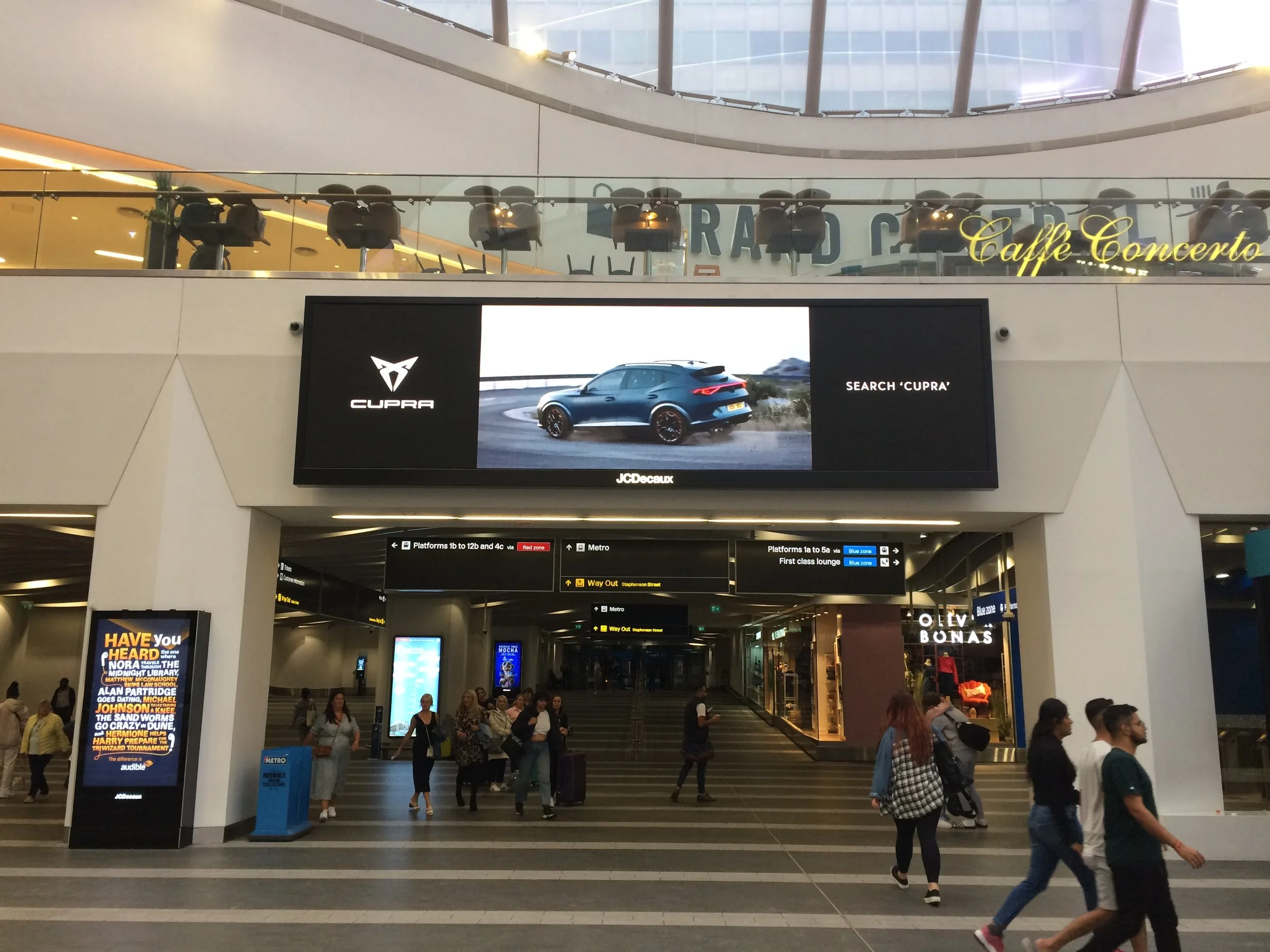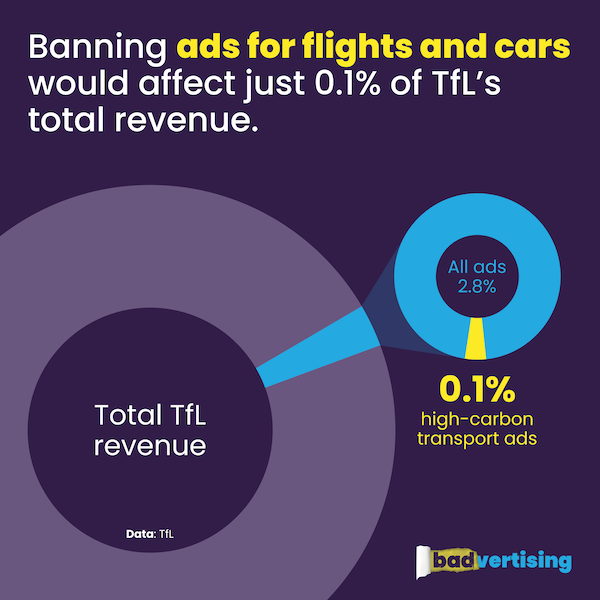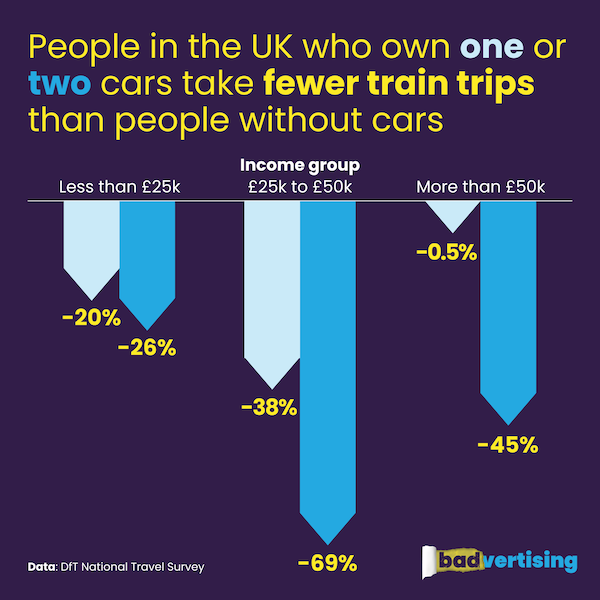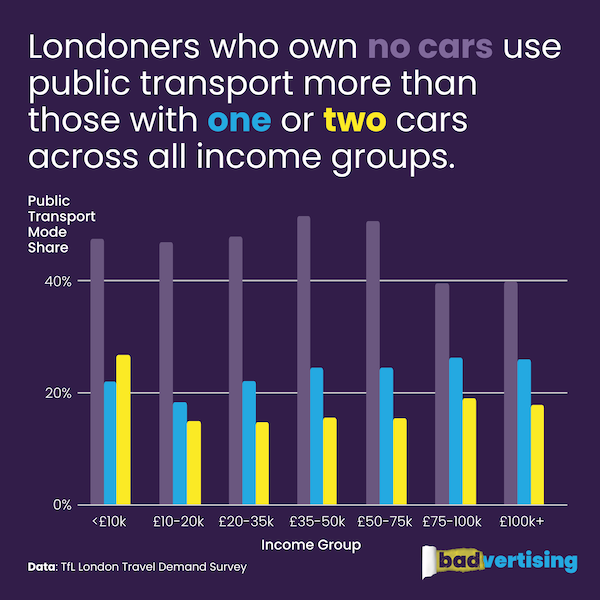Calls for UK public transport authorities to take common-sense measure to remove ads for polluting travel
Advert for a polluting SUV spotted at Birmingham New Street Station
Public transport authorities like Network Rail and Transport for London (TfL) have considerable advertising space: Network Rail is said to administer one of the largest advertising estates in the U.K. Surprisingly though, both networks still display adverts that directly counter their business interests, including ads for private cars and holidays abroad. In our latest research, we show that advertising for private cars in particular on Network Rail and TfL significantly undermines their key revenue streams, passenger fares, by actively disincentivising people to use UK rail transport.
We recently wrote to both Network Rail and TfL to recommend that, based on this evidence, they amend their advertising policies to remove adverts for high-carbon products and services - and cars in particular.
It is common sense that rail networks should not actively encourage the public to use modes of transport that are typically in competition with rail by promoting ads for cars and airlines across their networks. Our research shows that not only is this detrimental to their own objectives and commercial interests, but that the removal of advertising for high-carbon transport - and motor vehicles in particular - would also largely counterbalance the relatively small impact on revenues generated by these adverts.
New evidence: car ads harm public authorities’ interests
Over the summer 2022, we sent Freedom of Information requests to both Network Rail and TfL to find out about their advertising revenues and the categories of goods and services promoted across their estates. For TfL only,we were able to obtain information about the companies advertised under their Motor and Travel & Transport categories for the periods 2019/2020 and 2020/2021. This data revealed that a significant share of adverts were for cars and flights - including adverts for holiday destinations that are only easily accessible by plane. Our calculations, after removing companies in these sectors selling low carbon products and services (e.g. car-sharing apps or UK rail holidays), show that only 4% of TfL’s overall revenue is derived from adverts for high-carbon transport goods and services, while cars ads accounted for just 0.48%. As set out in Figure 1, advertising revenues account for around 2.8% of TfL’s overall gross revenues in a normal year, so ads for high carbon transport goods and services are generating around 0.1% of total TfL revenues - with car ads specifically bringing in just 0.01%
Figure 1: Estimated share of TfL advertising revenue derived from high carbon transport goods and services and cars specifically.
Based on data from the National Travel Survey (NTS), a household survey to monitor long-term trends in personal travel and to inform the development of policy, we found that car ownership per household is correlated with fewer train journeys. This was evidenced across all income groups (see figure 2 below).
Figure 2: Reduction in annual train journeys taken by English drivers compared to non-drivers, by income.
On top of this, we found a similar pattern for transport across London when analysing data from the London Travel Demand Survey (LTDS). The analysis shows (see figure 3 below) clearly that for all income groups, except the lowest, the more cars present in a household the fewer trips they make by public transport.
Figure 3: Public transport mode share in journeys taken by London residents, by income and number of cars in household
All the evidence above, combined with Badvertising’s flagship research on the positive correlation between car adverts and car ownership, offers clear information as to why rail authorities should have no interest, neither strategic nor commercial, to display advertising for unsustainable products and in particular fossil-powered vehicles.
Our demands: drop ads for cars to align with policy objectives
The changes we propose for Network Rail and TfL would be as simple as to add a clause to their respective Advertising Code of Acceptance and Advertising Policy which already lists several categories of advertising that are prohibited across their networks.
More importantly, both organisations have clauses in their existing policies to prohibit ads that would harm their companies’ interests.
Both Network Rail and TfL have publicly committed, as part of their net zero carbon targets and sustainability policies, to support a modal shift from road to rail. It is clear from our analysis that running adverts for cars run counter to these policy objectives.
These public transport authorities have a clear and legitimate interest to screen out adverts for polluting forms of transport.
In the case of TfL, there is an even stronger incentive to act given that the authority recently aligned with the London Mayor’s Food Strategy by banning ads for High Fats, Salt and Sugar products (HFSS) across its network in order to tackle child obesity. A similar policy should be enacted across TfL to align with the Mayor’s Transport Strategy and the transport elements of the London Environmental Strategy which have both clear objectives of a modal shift from road to sustainable and active travel.
We argue that the evidence provided with our latest analysis constitutes significant ground for removing adverts for cars in particular - with a vision to extend this ban to other forms of high-carbon advertising including flights, holiday destinations and fossil fuel companies.




